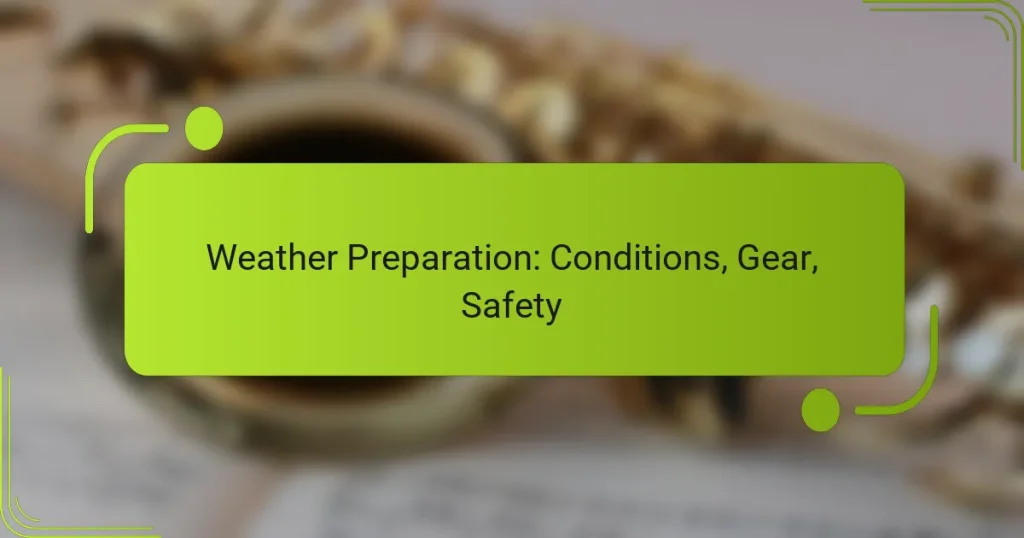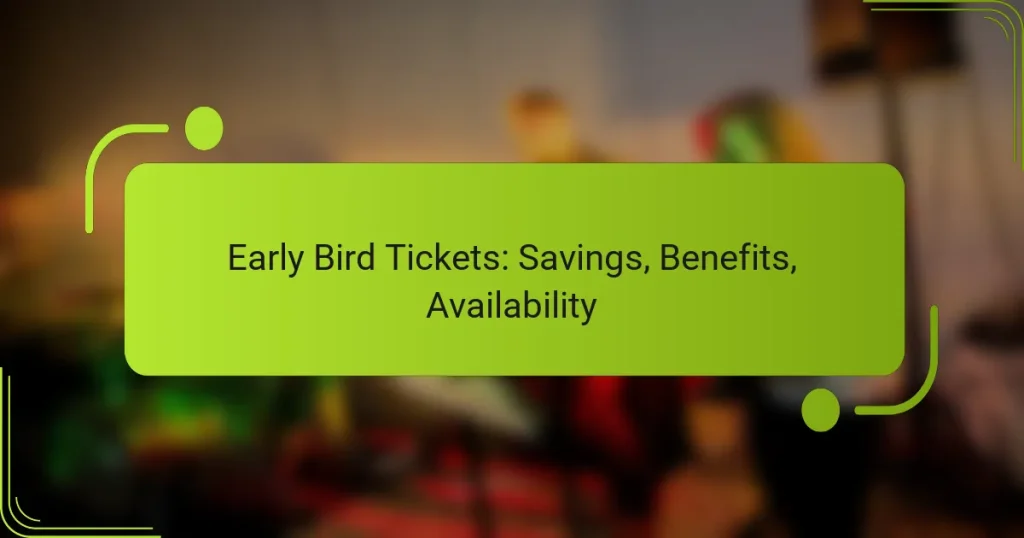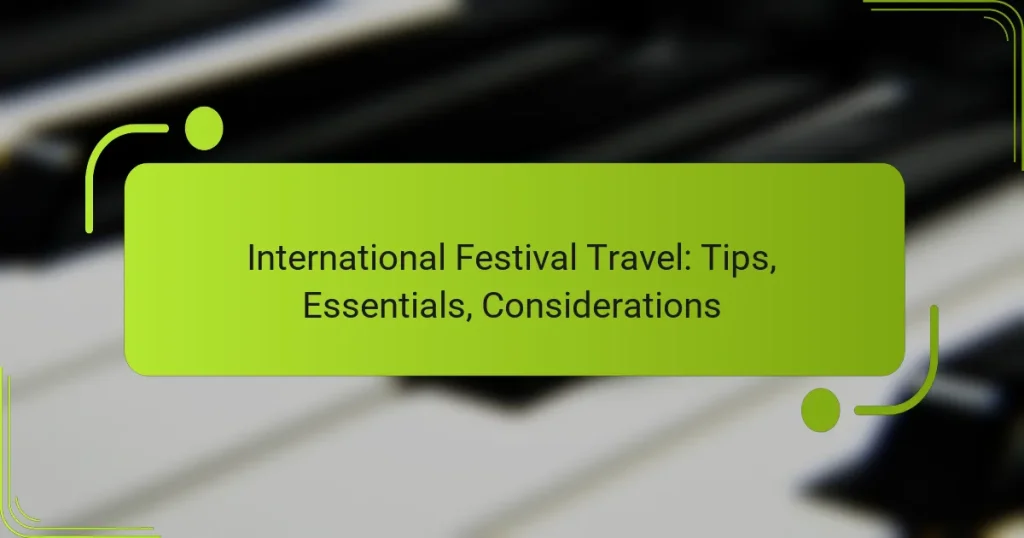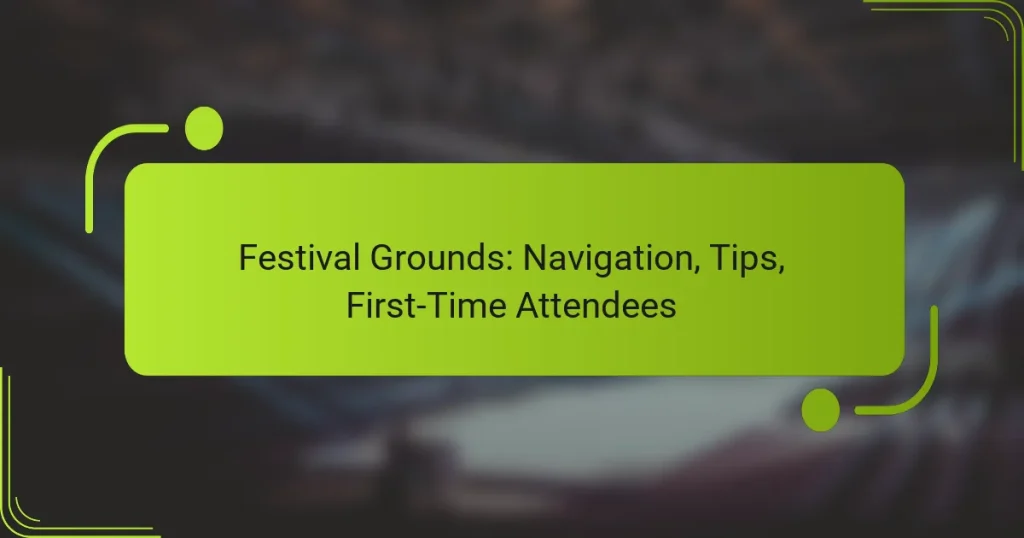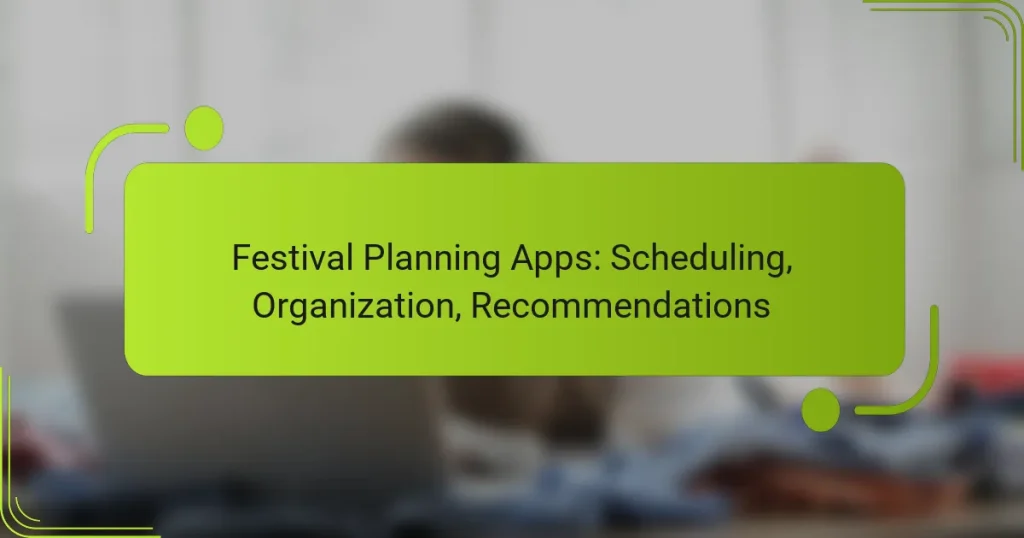Planning a successful festival requires careful consideration of various factors, from selecting the right location to effective marketing strategies. Understanding your target audience and budgeting for all potential expenses are essential steps in ensuring a memorable event. By focusing on these key elements, you can create an engaging and well-organized festival experience that attracts attendees and keeps them coming back year after year.
Early Bird Tickets: Savings, Benefits, Availability
International Festival Travel: Tips, Essentials, Considerations
Festival Grounds: Navigation, Tips, First-Time Attendees
Packing List: Essentials, Clothing, Gear, Food
Festival Budgeting: Costs, Expenses, Tips
Festival Planning Apps: Scheduling, Organization, Recommendations
How to choose the right festival location?
Selecting the right festival location is crucial for ensuring a successful event. Consider factors such as local demographics, venue capacity, accessibility, regulations, and weather patterns to make an informed decision.
Consider local demographics
Understanding the local demographics helps tailor the festival to the audience’s preferences. Analyze age groups, cultural backgrounds, and interests to create relevant programming and marketing strategies.
For instance, a family-oriented festival may thrive in areas with a high population of young families, while a music festival might attract a younger crowd in urban settings. Engage with community leaders to gain insights into local trends.
Assess venue capacity
Evaluating venue capacity is essential to accommodate expected attendees comfortably. Ensure the location can handle the projected crowd size without overcrowding, which can lead to safety issues and a poor experience.
As a guideline, consider a venue that allows for at least 20-30% more capacity than your anticipated attendance to account for last-minute ticket sales and walk-ins. Check for available facilities like restrooms and food vendors to support the crowd.
Evaluate accessibility options
Accessibility is a key factor in festival planning, ensuring all attendees can enjoy the event. Assess public transport options, parking availability, and pathways for individuals with disabilities.
For example, venues located near major transit lines or with ample parking spaces are preferable. Additionally, ensure that the site has ramps and accessible restrooms to accommodate everyone.
Research local regulations
Familiarizing yourself with local regulations is vital to avoid legal issues during the festival. This includes permits, noise ordinances, and health and safety standards that must be adhered to.
Contact local authorities to understand the necessary permits for hosting events, especially if serving food or alcohol. Compliance with these regulations can prevent costly fines and disruptions.
Analyze weather patterns
Weather can significantly impact festival attendance and overall experience. Research historical weather data for the chosen location during the festival dates to anticipate potential challenges.
For outdoor events, consider seasonal weather patterns, such as rain or extreme heat, and have contingency plans in place, like tents for shade or shelter. Providing attendees with weather-related information can enhance their experience and safety.
What are effective marketing strategies for festivals?
Effective marketing strategies for festivals focus on reaching the target audience through various channels, enhancing visibility, and driving ticket sales. Utilizing a mix of social media, influencer partnerships, email marketing, and event listing sites can significantly boost attendance and engagement.
Utilize social media platforms
Social media platforms like Facebook, Instagram, and Twitter are essential for festival marketing. Create engaging content that showcases the festival’s highlights, such as artist lineups, activities, and behind-the-scenes glimpses. Use targeted ads to reach specific demographics, ensuring your message resonates with potential attendees.
Consider using hashtags relevant to the festival to increase visibility and encourage attendees to share their experiences. Regular updates and interactive posts can help maintain excitement leading up to the event.
Engage local influencers
Partnering with local influencers can enhance your festival’s reach and credibility. Identify influencers who align with your festival’s theme and audience, and offer them complimentary tickets or exclusive access in exchange for promotion. Their endorsement can attract their followers, who may be interested in attending.
When selecting influencers, consider their engagement rates and audience demographics to ensure they effectively connect with your target market. Authenticity is key; choose influencers who genuinely appreciate your festival’s offerings.
Create targeted email campaigns
Email marketing remains a powerful tool for festival promotion. Build a mailing list by encouraging sign-ups through your website and social media. Segment your audience based on interests or past attendance to send personalized messages that highlight relevant aspects of the festival.
Craft compelling subject lines and include clear calls to action, such as early bird ticket discounts or exclusive merchandise offers. Regularly update subscribers with festival news to keep them engaged and informed.
Leverage event listing websites
Event listing websites like Eventbrite, Meetup, and local community boards can help increase visibility for your festival. Ensure your event is listed on multiple platforms to reach a broader audience. Include detailed descriptions, images, and links to ticket sales to attract potential attendees.
Monitor the performance of your listings and adjust your strategy based on which platforms drive the most traffic. Engaging with users who comment or ask questions can also enhance interest in your festival.
How to budget for festival expenses?
Budgeting for festival expenses involves identifying all potential costs and allocating funds accordingly. This ensures that you can cover essential expenses while also planning for unexpected costs.
Identify fixed and variable costs
Fixed costs are expenses that remain constant regardless of the number of attendees, such as venue rental, permits, and insurance. Variable costs fluctuate based on attendance and can include items like catering, staffing, and entertainment.
To effectively budget, list all fixed costs first, then estimate variable costs based on expected attendance. For example, if you anticipate 1,000 attendees, calculate food and beverage costs per person to get a total variable expense.
Allocate funds for marketing
Marketing is crucial for attracting attendees and should be a significant part of your budget. Consider allocating around 10-20% of your total budget to marketing efforts, which can include social media ads, flyers, and partnerships with local influencers.
Evaluate different marketing channels to determine their effectiveness. For instance, social media campaigns can be more cost-effective than traditional advertising, especially for reaching younger audiences.
Include contingency funds
Contingency funds are essential for covering unexpected expenses that may arise during the festival planning process. A common recommendation is to set aside 10-15% of your total budget for these unforeseen costs.
Having a contingency fund can help you manage emergencies, such as last-minute vendor cancellations or increased supply costs. This financial buffer ensures that your festival can proceed smoothly without compromising quality.
Research sponsorship opportunities
Sponsorships can significantly offset festival costs and provide additional revenue. Reach out to local businesses or larger brands that align with your festival’s theme and audience to explore potential partnerships.
When seeking sponsors, prepare a compelling proposal that outlines the benefits they will receive, such as brand visibility and access to a targeted audience. Consider offering different sponsorship tiers to attract a range of businesses.
What are essential logistics for festival planning?
Essential logistics for festival planning include organizing ticketing systems, managing vendors, and establishing security protocols. These elements ensure a smooth operation and enhance the overall experience for attendees.
Plan for ticketing systems
A well-structured ticketing system is crucial for managing entry and tracking attendance. Consider using digital platforms that allow for easy purchase and scanning, which can streamline the check-in process.
Set clear pricing tiers, such as early bird, general admission, and VIP options to cater to different budgets. Ensure that your ticketing platform can handle a high volume of transactions, especially during peak sales periods.
Coordinate vendor management
Effective vendor management is key to providing diverse food, merchandise, and services at your festival. Create a comprehensive list of potential vendors and assess their offerings, reliability, and past performance.
Establish clear contracts that outline expectations, payment terms, and logistical details like setup times and space requirements. Regular communication with vendors before and during the event can help address any issues promptly.
Establish security protocols
Security protocols are vital for ensuring the safety of festival-goers and staff. Start by conducting a risk assessment to identify potential threats and vulnerabilities specific to your event.
Develop a security plan that includes crowd control measures, emergency response procedures, and coordination with local law enforcement. Train staff and volunteers on these protocols to ensure everyone knows their roles in maintaining a safe environment.
